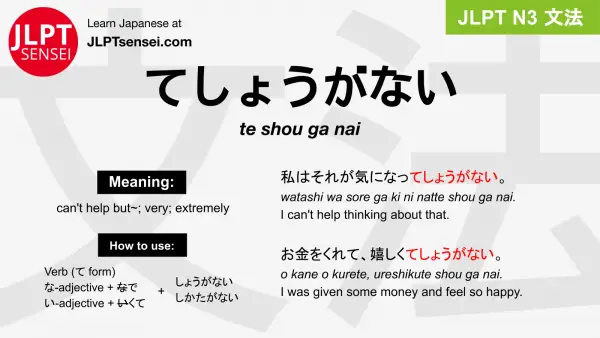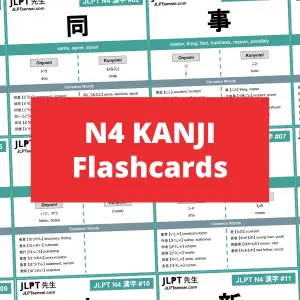Learn Japanese grammar: てしょうがない (te shou ga nai) & て仕方がない「てしかたがない」 (te shikata ga nai). Meaning: can’t help but; very; extremely ~.
This grammar expresses a natural feeling or emotion that is out of control of the speaker.
For shikata ga nai, both the kanji and hiragana versions are commonly used.

Click the image to download the flashcard.
Download all N3 grammar flashcards.

Download our complete
JLPT N3 Grammar Master E-book.
Access ALL extra downloads, ebooks, and study guides by supporting JLPT Sensei on Patreon.
てしょうがない・てしかたがない - Example Sentences 例文
Each example sentence includes a Japanese hint, the romaji reading, and the English translation.
Click the below red button to toggle off and and on all of the hints, and you can click on the buttons individually to show only the ones you want to see.
Example #1
私はそれが気になってしょうがない。
Example #2
今日は寒くてしょうがない。
Example #3
今日は何もすることがなくて、暇で仕方がない。
Example #4
お金をくれて、嬉しくてしょうがない。
Example #5
バスで行くのは、時間がかかってしょうがない。
Example #6
海外で一人暮らしを始めたばかりなので、寂しくてしかたがありません。
Example #7
最近はやることがないので、毎日が暇でしかたがない。
Example #8
好きなアイドルのライブのチケットが売れ切った。遅刻して、もう買えないので残念でしょうがない。
Vocabulary List 語彙
| Kanji 漢字 | Kana カナ | English 英語 |
|---|---|---|
| 睡眠不足 | すいみんぶそく | sleep deprivation |
| 疲れる | つかれる | to be tired |
| お腹が空いた | おなかがすいた | to be hungry (empty stomach) |
| 気になる | きになる | to be interested |
| 暇 | ひま | free time (nothing to do) |
| 嬉しい | うれしい | happy |
| 売れ切る | うれきる | to sell out |
| 遅刻する | ちこく | to be late; tardy |
| 残念 | ざんねん | unfortunate |
View all JLPT N3 Vocabulary Lessons

View all JLPT N3 Grammar Lessons
JLPT N3 Study Guide
JLPT N3 Grammar Master [e-book]
Complete Study Guide
This e-book includes every grammar point you need to know in order to pass the JLPT N3, with detailed usage notes and numerous example sentences.
Pages: 378.
Grammar lessons: 182.




